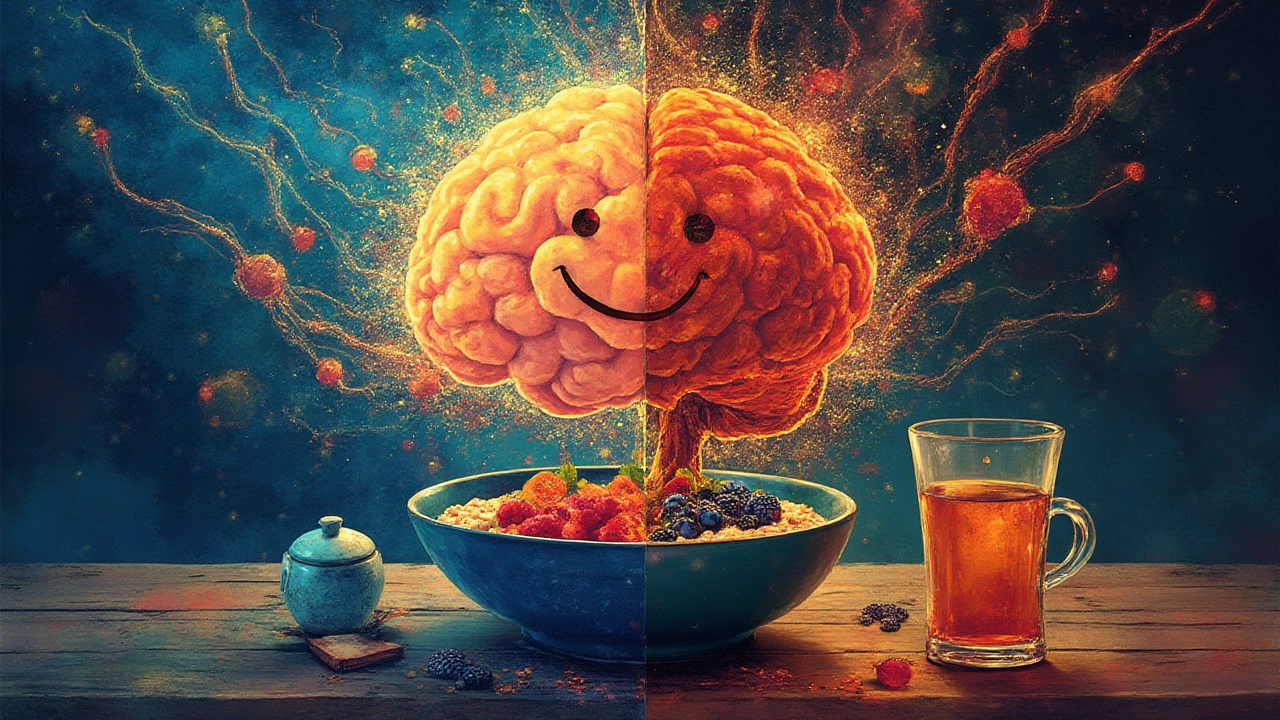If you’ve ever noticed your mood drop after a junk food binge or felt unexpectedly cheery after a wholesome meal, you’re not imagining things. What you put on your plate plays a bigger role in your mind than you might think. Researchers are calling this the ‘gut-brain connection,’ and it’s shaking up everything we thought we knew about mental wellbeing. You don’t need a PhD—or a green smoothie obsession—to make changes that really matter. Simple diet tweaks can help lift your mood, sharpen your focus, and even lower your risk of anxiety and depression. So, why does what you eat have such a hold on your mind?
The Science Linking Food and Mood
Scientists have been digging into the food-mood link for decades, but it’s only in recent years that the connection has become crystal clear. The hot topic now? The gut-brain axis. Imagine this as a superhighway running between your digestive system and your brain. Signals bounce back and forth nonstop, influencing everything from stress to sleep to your latest craving.
Here’s the kicker—about 95% of your body’s serotonin (yep, the ‘feel-good’ neurotransmitter) is made in the gut, not the brain. Eating foods that nourish your gut bacteria, like yogurt, kefir, and whole grains, can help your body pump out more of those mood-boosting chemicals. According to a 2022 study by the University of Sydney, people who ate more probiotic-rich foods reported less anxiety and improved mood compared to those who didn’t. Another 2023 UK trial found a clear drop in depressive symptoms among folks who switched to a Mediterranean-style diet, loaded with plants, fish, and olive oil.
It’s not just about what you eat but also what you’re missing. Diets loaded with sugar and processed food have been tied to higher rates of depression and anxiety. One theory is that these foods cause inflammation, and chronic inflammation affects the brain in sneaky ways, making it harder for those feel-good brain chemicals to do their job. Flip that around, and diets rich in colorful fruits, nuts, and fatty fish act as a kind of shield, protecting your mind from emotional ups and downs.
Check out this quick look at research-backed links between nutrients and mental health:
| Nutrient/Food | Mental Health Effect | Main Sources |
|---|---|---|
| Omega-3 Fatty Acids | Lowers risk of depression, boosts brain function | Salmon, sardines, walnuts |
| B Vitamins (esp. B12, Folate) | Fights fatigue, stabilizes mood | Leafy greens, eggs, legumes |
| Probiotics | Supports serotonin production, reduces anxiety | Yogurt, kefir, kimchi |
| Magnesium | Calmness, better sleep | Dark chocolate, nuts, seeds |
| Antioxidants | Protects from oxidative stress (linked to depression) | Berries, spinach, beans |
Key Nutrients That Shape Your Mindset
Let’s be real—nobody wants to memorize the entire periodic table or count out lentils one by one. But paying attention to a short list of nutrients makes a world of difference. First off, let’s talk omega-3s. Your brain is nearly 60% fat, and a chunk of that is these healthy fats. Eating oily fish twice a week, or snacking on walnuts and chia seeds, gives your brain what it needs to help manage mood swings and sharpen memory.
Next up, B vitamins—especially B6, B12, and folate. People with low levels of these vitamins are more likely to feel down or ‘foggy.’ One simple change is swapping white bread for whole grain and adding leafy greens to salads. Don’t forget about protein, either. Amino acids from foods like chicken, tofu, or eggs are used to build neurotransmitters like dopamine, which help you feel motivated. If you’re skipping meals or not getting enough protein, your brain can feel like it’s running on empty.
Then there’s magnesium. If you’re tossing and turning all night or feel jittery during the day, you might not be getting enough. Dark chocolate (finally, an excuse!), almonds, and spinach are easy fixes. Zinc deserves a mention too—a 2021 review in "Nutrients" found that low zinc is linked with higher rates of depression, especially in teens and older adults. Foods like chickpeas, beef, and pumpkin seeds can help keep those zinc levels up.
Your body and mind love antioxidants, too. These are compounds found in colorful foods like berries, peppers, and citrus. They help fight something called oxidative stress, which can damage brain cells and mess with mood. A handful of blueberries or a sweet bell pepper at lunch can help make a difference.

The Microbiome: Your Gut’s Secret Superpower
This is where things get a bit wild. There’s an entire universe of bacteria living in your gut, and they’re loud players in the mind game. Healthy microbiomes have been linked to lower rates of depression and sharper brainpower. That means feeding your gut can do way more than ease a stomachache.
How do you keep your gut army happy? It starts with fiber-rich foods like oats, apples, beans, and especially those leafy greens everyone tells you to eat. When you eat fiber, your gut bacteria turn it into short-chain fatty acids, which lower inflammation and support brain health. Fermented foods like sauerkraut, miso, and kombucha are full of probiotics—friendly bacteria your body loves.
If you’re getting sick of plain yogurt, try blending it with fruit or topping a baked potato with kimchi. Introduce new probiotic foods slowly to avoid stomach upsets. It might feel a little strange at first, but the payoff’s real: a 2024 review from the American Journal of Psychiatry showed that people who added one serving of fermented food daily reported less stress after just a month.
And don’t stress about making everything from scratch. Even small changes—like trading processed snacks for an apple with peanut butter—can boost your gut health. If you feel better after making these changes, that’s not just your imagination; your gut-brain axis is alive and kicking.
Diet Traps That Sabotage Mental Wellbeing
Let’s be honest: the modern food landscape is basically an obstacle course for your mind. It’s way too easy to reach for processed snacks or chug a sugary latte when life gets busy. But ultra-processed foods—think chips, packaged pastries, and sweetened cereals—can quietly drag your mental health down. One 2023 Harvard study showed that people consuming the most processed foods had a 21% higher risk of depression compared to those who kept it simple with whole foods.
Why do these foods have such a rough effect? First, they usually lack fiber, vitamins, and minerals, starving your body of what it needs. They’re also loaded with added sugars and unhealthy fats, which spike your blood sugar and set off inflammation. The catch is in the rollercoaster crash: a sugar rush might feel good at first, but the crash leaves you irritable or anxious.
Another hidden trap is skipping meals or extreme dieting. Your brain runs on a consistent flow of energy. When you crash-diet or fast all day, your mood tanks, you lose focus, and you start craving all the ‘wrong’ things after sundown. If you’re prone to hangry outbursts, try eating regular meals and healthy snacks—even a handful of nuts or a piece of fruit counts.
Don’t fall for fad diets that cut out entire food groups, either. Sure, cutting carbs might sound like a shortcut to feeling lighter, but your brain depends on steady carbs—like oats, sweet potatoes, or whole grain rice—to keep neurotransmitters working. Restrictive diets, especially without guidance, can backfire and make mood swings worse.
Here’s an easy fix worth trying: aim for a ‘rainbow plate’ every day. Fill your plate with as many colors as you can—each color packs its own unique set of nutrients and antioxidants. It’s a simple way to cover your bases without getting lost in endless nutrition charts.

Simple Steps to Boost Brain Food in Everyday Life
Now for the part everyone actually wants—the how-to guide you can start using right away. You don’t need to micromanage every calorie to support your mental health. Start with these low-effort, high-impact tweaks:
- Nutrition first: Swap one ultra-processed snack for something fresh, like berries or carrot sticks, once a day.
- Add oily fish (salmon, sardines, or mackerel) to your meals a couple of times a week. Not into fish? Walnuts and flaxseeds are solid plant options.
- Try a new fermented food—maybe sauerkraut or kefir—in your lunches for a probiotic boost.
- Say yes to leafy greens. Toss a handful of spinach or kale into pasta, soups, or sandwiches.
- Don’t skip meals, especially breakfast. If you’re in a rush, even Greek yogurt with some fruit or a boiled egg counts.
- Cut back on the soda or sweetened drinks. Swap to water, herbal tea, or sparkling water with a splash of lemon.
- If you struggle with stress or low energy, check your magnesium intake—snack on pumpkin seeds or reach for a little dark chocolate.
- Don’t go it alone. If eating well feels overwhelming, consider talking with a registered dietitian. They can help tailor suggestions to your life (and budget).
It may take a few weeks to notice a clear mood shift, but stick with it and pay attention. Even small changes can pile up to create a real difference in the way you think, feel, and show up in the world. Mental health isn’t just about therapy or medication; it starts with what you put on your plate.





